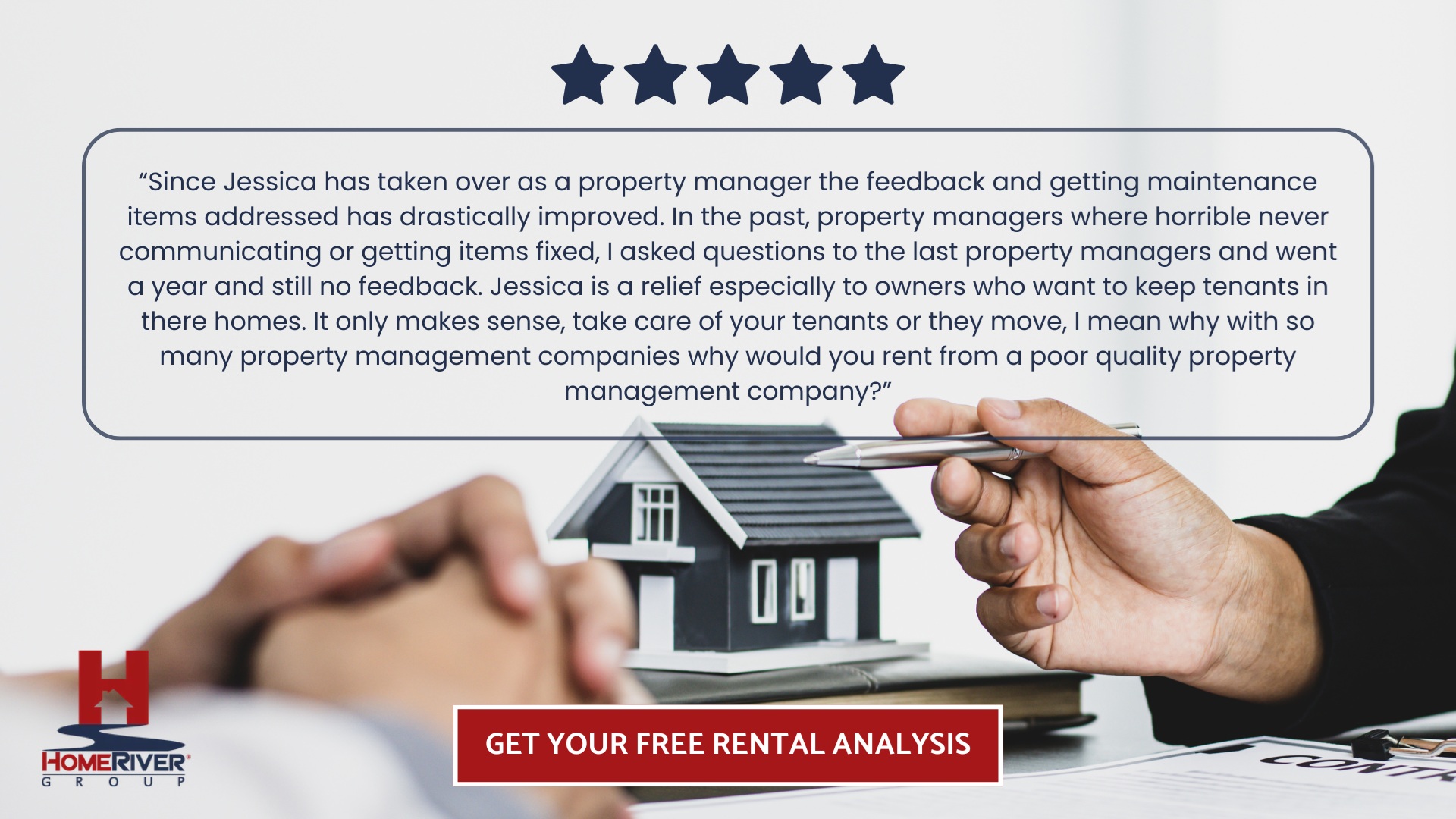
What Is The Average Property Management Fee For Rental Properties? Here's What You Need To Know
HomeRiver Group stands at the forefront of property management, blending a unique combination of localized attention with the efficiency of centralized operations. As the premier national property management company, we know that your property is a significant priority, and making informed decisions is key to maximizing your investment's potential.
Navigating the world of rental properties can be daunting for both renters and buyers. Whether you're an experienced real estate investor or a first-time landlord, understanding the nuances of property management fees is crucial. These fees can significantly affect your rental income and the overall profitability of your investment.
In this article, we discuss one of the most critical aspects of rental property investment: the average property management fee.
Factors That Influence Property Management Costs
Understanding what is the average property management fee for rental properties requires a deeper dive into the various factors that can affect these costs. Property management fees are not fixed and vary widely depending on several key factors.
Property Type
The type of property you own significantly influences management fees. Residential properties, for example, tend to have fee structures different from commercial or multifamily properties. Each property type has its unique management needs and risks, which are reflected in the fee.
Location
The location of your property can also affect management costs. Properties located in high-demand urban areas might incur higher management fees due to increased living and operating expenses in such locations. Conversely, more rural or less populated properties may attract lower fees.
Services Provided
The range of services provided by the property management company plays a crucial role in determining the fee. Basic services might include tenant screening, rent collection, and maintenance requests. More comprehensive services can encompass renovations, extensive marketing for property listings, and legal services such as evictions or lease negotiations. Naturally, the more services you opt for, the higher the management fee might be.
Property Condition
The condition of the property, when handed over to the property management company, can influence initial and ongoing management fees. Properties that require significant upfront repairs or maintenance to become rent-ready or to maintain standards may see higher fees to compensate for the extra work and coordination required.
Rent Collection And Fee Structure
Management fees can also vary based on how rents are collected and the fee structure in place. Some property management companies charge a flat monthly fee, while others opt for a percentage of the monthly rent collected. Additional fee structures include lease renewal, vacancy, or maintenance markup fees. The fee structure chosen will directly impact the overall cost of property management services.
Owner Involvement
The level of involvement the property owner desires can influence management costs. Owners who prefer to be hands-off and leave most decisions and day-to-day operations to the property manager might pay a premium for this convenience. On the other hand, more involved owners may negotiate lower fees by taking on some of the responsibilities themselves.
Percentage vs. Flat Fee Structures
When exploring property management options for rental properties, understanding the difference between percentage-based and flat fee structures is crucial. Each model has its own set of advantages and considerations, directly affecting the management cost and the expected services.
Percentage-Based Fees
The most common structure for property management fees is the percentage-based model. Here, the fee is a percentage of the monthly rent collected from the property. The average percentage rate can vary significantly depending on geographical locations, the type of property, and the range of services included. Typically, the percentage rate falls between 8% and 12% of the monthly rent for single-family homes and smaller rental units.
This model incentivizes property managers to keep their rental occupied and rent at the highest possible rate, aligning their interests with yours as the property owner. However, it's essential to clarify what services are included in this fee, as some companies may charge extra for maintenance, marketing, or tenant placement services.
Flat Fee Structures
Alternatively, some property management companies operate on a flat fee structure. This means you pay a fixed monthly amount regardless of your rental income. This model is less common but can be advantageous for owners of multiple properties or those with higher rental income, as it provides cost certainty and simplicity in budgeting.
Flat fees may range from $100 to several hundred monthly, depending on the services provided. While it might seem appealing to have a fixed cost, it's important to review what services are included in this fee meticulously. Some companies might offer a bare minimum service for the base fee, with additional services available at extra costs.
Making The Right Choice
Choosing between a percentage-based fee and a flat fee structure depends on several factors, including your financial preferences, the level of involvement you desire in your property's management, and the complexity of managing your property. It's also vital to consider the reputation and reliability of the property management company you choose.
Additional Fees In Property Management Contracts
Understanding the average property management company fees for rental properties is fundamental when exploring the intricacies of property management, especially regarding the financial commitments involved. However, it's just as crucial to familiarize yourself with the potential additional fees that might appear in property management contracts.
Leasing Fees: Covers advertising, tenant screening, lease execution, and property preparation for move-in; typically 50% to 100% of the first month's rent.
Renewal Fees: Charged for renewing a tenant's lease, covering administrative tasks; usually a flat fee or a percentage of the monthly rent.
Maintenance Mark-up Fees: An added charge of 10% to 20% on maintenance costs to compensate for coordinating and overseeing repairs.
Late Fee Allocation: Part of tenant late fees may go to the property manager; details vary by agreement and should be reviewed carefully.
Eviction Fees: It covers legal, court, and administrative costs for handling tenant evictions; fees vary by complexity and jurisdiction.
Understanding Your Contract
It's essential for property owners to carefully review and understand all the potential fees laid out in the property management contract. Transparent and upfront communication with your property management company, like HomeRiver Group, is critical to ensuring no surprises. Our commitment to providing owners with a comprehensive range of services under one roof ensures that your property is our priority, and you're supported by dedicated local market expertise with the efficiency and transparency of our unified national platform.
The Impact Of Property Size And Type On Management Costs
Understanding the average property management fee for rental properties requires a deeper look into how the size and type of property can influence these costs. When considering property management services, it’s essential to recognize that no one-size-fits-all solution applies universally across all rental properties.
Single-Family vs. Multi-Family Properties
Single-family homes often attract a different management fee structure than multi-family units. This is because managing these properties is more individualized. Single-family rentals usually require more individualized attention per unit, including specific leasing processes, maintenance, and tenant management. As a result, property management companies may charge a higher percentage fee for single-family homes to account for the additional time and resources expended.
In contrast, multi-family properties, such as apartment complexes or duplexes, can offer property managers economies of scale. Managing multiple units in one location allows for a more streamlined process in terms of maintenance, tenant communication, and leasing operations. Consequently, the average property management fee for these types of properties may be lower per unit, reflecting the efficiencies gained in managing multiple rentals under one roof.
The Role Of Property Size
Aside from the property type, the size, often determined by the number of units or bedrooms, can also influence management fees. Larger properties, especially those with numerous units, might require significant attention, potentially driving up the cost of property management services. Additionally, the complexity of managing a large-scale property with various amenities (e.g., swimming pools, fitness centers, community areas) can lead to higher fees to compensate for the increased workload and specialized services required.
The Pros Of Investing In Professional Property Management
When considering the expenses associated with owning rental properties, including the average property management fee, it's also critical to understand the value these services bring to the table. Investing in professional property management, like the services provided by HomeRiver Group, offers numerous advantages that can enhance both the profitability and ease of owning rental properties.
Expert Market Insights And Pricing Strategy
Professional property managers possess deep local market knowledge. This expertise allows them to accurately price your rental, ensuring you receive the best possible return on your investment. Proper pricing reduces vacancies and attracts quality tenants, a crucial component for long-term profitability.
Comprehensive Tenant Screening Processes
The value of having reliable, respectful tenants cannot be overstated. Professional property management companies implement thorough screening processes to vet potential tenants, which include credit, employment, and criminal background checks. This meticulous approach minimizes the risk of problematic tenants and ensures a stable rental income.
Efficient Rent Collection And Financial Reporting
One of the most tangible benefits of professional property management is handling rent collection and financial record-keeping. Property managers act as the intermediary between owners and tenants, ensuring rent is paid on time and handling any discrepancies or arrears. Moreover, they provide detailed financial reports, making it easier for property owners to understand their investment performance.
Maintenance And Repair Coordination
Maintaining a property can be both time-consuming and costly for owners. Property management companies take the headache from property maintenance by coordinating repairs, performing routine inspections to prevent major issues, and ensuring the property meets all local codes and regulations. This saves time and money and preserves or increases the property's value.
Legal Compliance And Dispute Resolution
Navigating the legal aspects of rental properties, from tenant-landlord laws to local housing regulations, can be daunting. Professional property managers are well-versed in these areas, ensuring compliance and protecting owners from legal issues. They also handle dispute resolution with tenants, providing peace of mind and minimizing owner stress.
Enhanced Tenant Retention Strategies
Keeping good tenants is just as important as finding them. Property managers implement strategies to increase tenant satisfaction and encourage lease renewals, contributing to consistent rental income and reduced turnover costs for owners.
Final Thoughts
Understanding the average property management fee for rental properties is crucial when considering renting or purchasing a property. It affects your budgeting and investment strategy and influences the level of service and support you can expect. Typically, these fees vary depending on various factors, including property type, services provided, and geographical location. However, they are essential for ensuring your property is professionally managed, maintained, and marketed.
At HomeRiver Group, we understand that every property is unique, and so are the needs of every owner and tenant. Our extensive multi-state footprint combined with our centralized operations backs our commitment to giving you the best of both worlds—dedicated local market expertise and efficient, tech-savvy asset management and reporting capabilities.
In navigating the complexities of managing rental properties, remember that the right property management fee aligns with the quality of service and peace of mind. That's what we strive to provide every day at HomeRiver Group.
Read also:
How Property Management Companies Can Benefit Florida Landlords
How Property Management Can Save Houston Landlords Time & Money
Frequently Asked Questions About What Is The Average Property Management Fee For Rental Properties
How do property management fees typically work?
Fees are percentage-based or flat, covering services like tenant placement, rent collection, maintenance, and inspections. Services offered differ among property management companies.
Are property management fees tax-deductible for rental properties?
Yes, they’re deductible as a business expense. Always consult a tax professional to understand deductions specific to your rental property situation.
How do management fees vary by property type?
Fees differ by property type, with single-family homes, multi-family units, or commercial properties requiring varying management effort and cost.
Does the location of my property affect the management fees?
Yes, urban properties may have higher fees due to demand and management complexity, while rural properties often incur lower management costs.
What percentage do most property managers charge?
Most managers charge 8% to 12% of monthly rental income, depending on property location, type, and scope of management services.
What is the difference between a flat fee and a percentage-based management fee?
Flat fees are fixed regardless of rental income, offering predictable costs, while percentage-based fees align with property earnings and fluctuate as rental income changes.
What services are included in property management fees?
Fees usually include property marketing, tenant screening, rent collection, lease management, maintenance coordination, and legal compliance services.
What is the average property management fee for rental properties?
Average fees range from 8% to 12% of monthly rental income but vary based on services, property type, and location.










